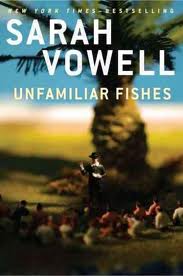 [Riverhead; 2011]
[Riverhead; 2011]
by Martina McLennan
It’s natural to want to divide history up, designate start and end dates, create eras — in short, to make order out of chaos. In recent years, it’s become fashionable to note that this instinct gets us into trouble, as indeed it often does. We overlook glaring facts that call into question our most cherished dates and dividers (witness the decades-long resistance to rethinking 1492 as the official date of American “discovery”), while glossing over the massive changes that can occur within a single era. Oops.
So I feel a slight pang of guilt in saying this, but I’m going to say it nonetheless: maybe we need to bring it back. The chronology, the superficial “eras,” the everything — well, ok, maybe not the pretending that Columbus discovered America, but at least a smidge of the orderliness. Because the truth is, it makes history a hell of a lot easier to follow.
This is the silent plea I made while drifting through regular NPR contributor Sarah Vowell’s latest missive, Unfamiliar Fishes, a slightly frenetic history of “the Americanization of Hawaii.” The end story of the annexation of Hawaii gives all the satisfaction of a good train wreck, as each link in the chain of events predictably, unstoppably, moves to the next. We know how the story ends — it’s a familiar one, after all, about materialistic greed trumping consideration for the autonomy of the natives — but it still fascinates as its own unique variation on a theme that consumed various plots of American land hundred of times over.
Unfortunately, Fishes is generally more concerned with cleverness than sticking to a consistent narrative, so chronology often gets lost in asides on subjects as diverse as macaroni glop, the Iraq war, and a grumpy attendant at the Moby Dick museum. And, if you’re anything like me — that is, more or less a novice in Hawaiian history — you’ll likely find yourself quite lost.
The most awkward thing about Fishes, though, is that Vowell often comes off like a guest who crashed the party and then forgot why she wanted to come in the first place. The book’s back cover tells me that Vowell believes “1898 might be a year just as crucial to our nation’s identity [as 1776]” and that “of all the countries the United States invaded or colonized in 1898, Vowell considers… the Americanization of Hawaii to be the most intriguing,” which is nice, but I wish that I had been told by the book itself, rather than its blurb. The intrepid reader will spend plenty of time trekking around the islands with Vowell and her nephew Owen – to clifftops, to palaces, to obscure sites of missionary history – but will learn very little about why, apparently, Hawaii’s history carries such weight with our guide. The omission wouldn’t be so palpable in a traditional history book, but Fishes is anything but, and it’s a jarring feeling to read a part-memoir without any concrete sense of why the memoirist herself cares. It’s the worst casualty of the book’s ADHD, take-no-prisoners style, and it only adds to the sense that something here is still fragmented and incomplete.
This is not to say that Fishes is without redeeming qualities. It is, at times, quite entertaining, and — when coherent — also informative. Those already familiar with Hawaii will likely find it a thought-provoking meditation on connections between that state’s history and broader American themes of imperialism, mixing-pot culture and the cutthroat competition for natural resources. And I suspect that it will make an excellent audiobook, a medium in which formal organization is less crucial and Vowell’s considerable skill as a voice talent should carry the day.
And, despite all the scrappiness and the unanswered questions, though, there are glimpses here of a great story — and it does contain a poignant truth or two about the nature of our American project. At one point, Vowell pauses to dwell on our historical tendency to presuppose that native populations need some sort of saving (“the high-fructose corn syrup” of Christian-Americanism), often without having any way of knowing whether we would be right or wrong once we got there. “Our greatest goodness and our worst impulses come out of this missionary zeal, contributing to our overbearing (yet not entirely unwarranted) sense of our country as an inherently helpful force in the world,” she writes. “And, as with the apostle Paul, the notion that strangers want our help is sometimes a delusion.”
It’s a great observation, one that is only possible in such an uncertain and shifting paradigm. Oh, I still prefer order, don’t get me wrong. But the few, wonderful moments like this along the way make me admit that it’s almost — just almost — worth braving the chaos that surrounds it.
This post may contain affiliate links.








